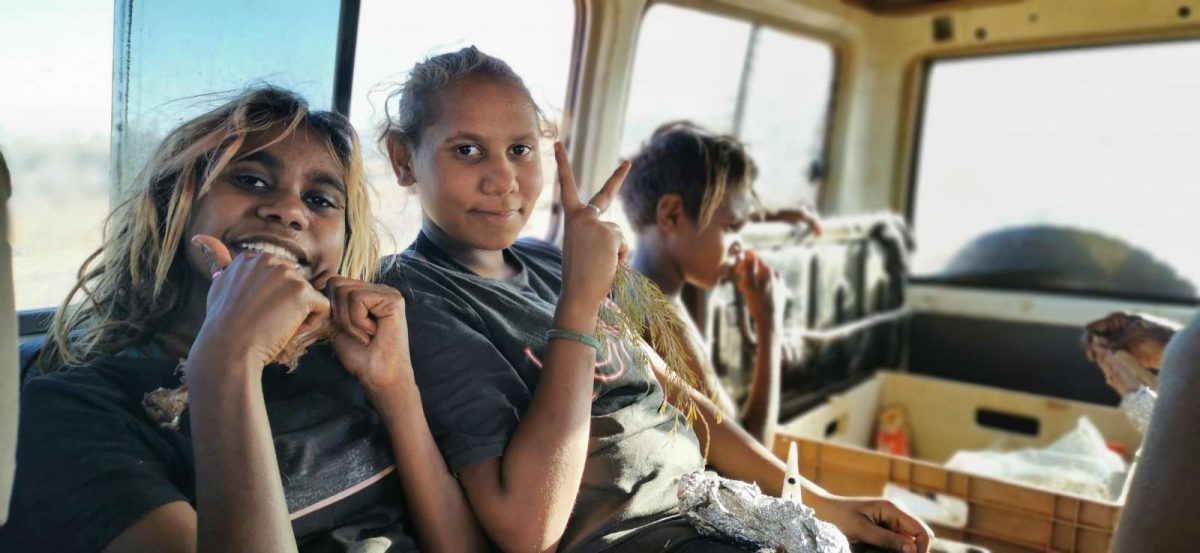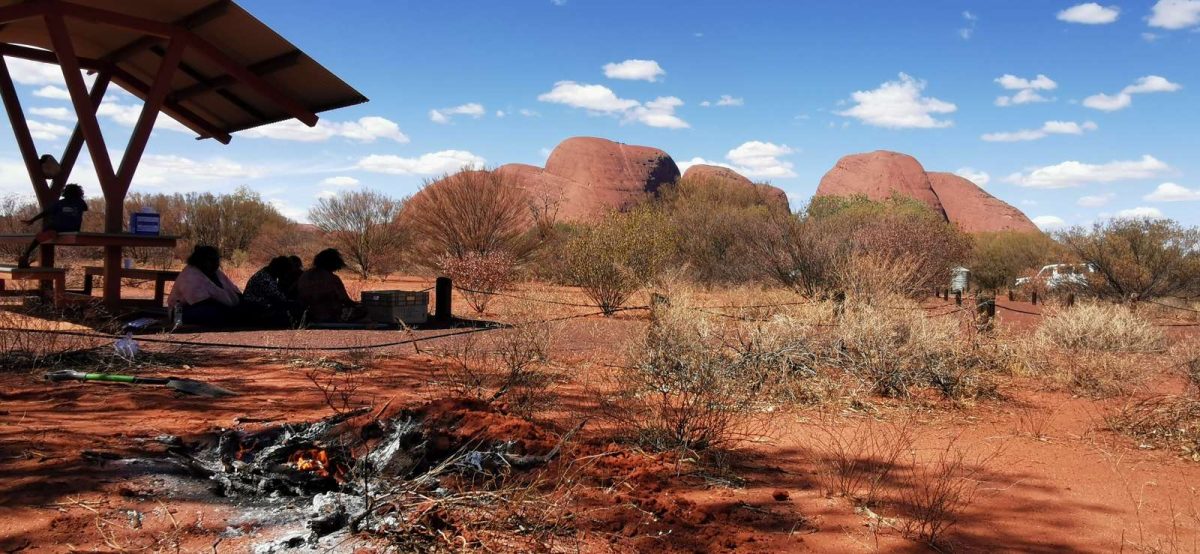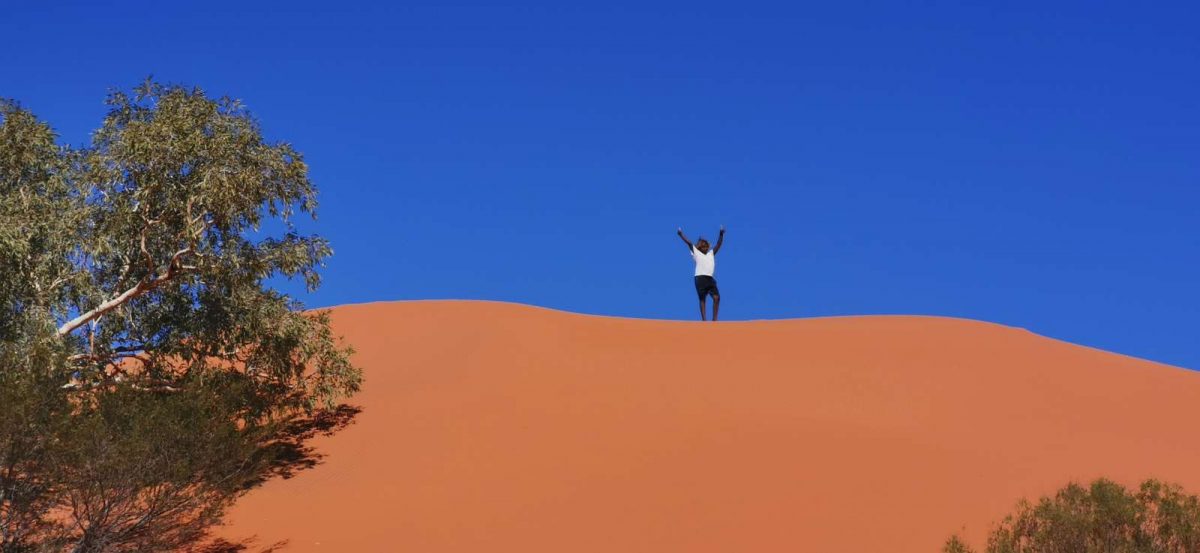You’re in the middle of the desert, standing on the edge of an ancient salt lake, a custodian of the land standing by your side, you take a deep breath of warm desert air and BUZZZ two flies shoot up your nostrils one on each side. Just like that, serenity is brutally interrupted. The old man standing next to you lets out a small sideward smile which is defiantly at your expense. Moments like these were common over the last few weeks.
Maruku staff have had the pleasure to be working alongside Mutitjulu Community Aboriginal Corporation’s Night Patrol to run bush trips daily for local Anangu families. The program was such a success and Anangu were sad to see the last trip go out yesterday. School is back but we hope that funding can be gained for further trips. But for now let’s reflect on what the last few weeks looked like.
Warehouse conversion
Every morning Jess, Sarah and Jowel (three of Maruku’s experienced outback explorers) would enter the Maruku warehouse and approach the large wooden table in the centre of the office. On a normal day, this table would be FULL of punu (wood carvings) and freshly painted canvas, but now we find it piled up with flour, tea bags, oranges and cleaning products. Our explorers would pack all the essentials for a trip out bush, including (most importantly) a box of kangaroo tails. Once the troopies were given a thorough Covid-19 scrub they were off to pick up a family. The covid-19 restrictions have only allowed us to take family groups that are living in the same household but this hasn’t been much of an issue. Our Maruku staff pull up to a house and slowly, one by one, the family emerges. First the older people who give the driver a nod of approval, then there is a sharp “Pakala! Pakala! Ananyi ngura wiru!” (Get up! Get up! We are going out to a great spot), after which the smaller kids poke their heads out the door. Eager to get out bush they jump into the back of the car. From here Anangu take control.

Where are we going?
Now the real work begins. Troopies head in different directions. Off to the big red rock that casts its shadow over the community in the afternoons, or perhaps to a popular tourist lookout that is usually swamped with minga (Tourists), or even a homeland that our drivers are told is only one hour’s drive away. It’s up to the family. After arriving at the location the kids bust open the back door of the troopie, grab some shovels and start digging, maybe for maku (Witchetty grub) or maybe just for the fun of it. The fire is started to cook up the roo tails everyone has been drooling over in the back of the car and the billy heated for tea. On one of the last trips the Wilson family decided to have a wiltja (shelter) making competition. After a few hours of connecting to their roots the families are ready to head back to community. These corrugated dirt roads back to community can make you feel as though your eyes will jump from their sockets but yet somehow the kids are fast asleep.

Anangu’s work
Now this may seem like a fun filled day of adventure, food and four wheel driving (which it mostly certainly is) but it is also much more than that. Anangu have been asking for a program similar to this for decades. A way to go back home, feel the same red dirt their ancestor felt between their toes, to get back to basics, and to connect once again to spirit. To pass this knowledge onto the younger generations is important work for Anangu. It has been a massive privilege for Maruku staff to be involved in this program and being able to see this magic at work is breath taking. One trip in particular brought to light the power that is connection to land.
A Trip of a lifetime
After leaving community a little too late, Jowel and Jessica drove in convoy with the Teamay household to country just outside of the national park. The track in was tough heading over sand dunes and scraping the side of the troopies with overgrown mulga bushes but the trip was well worth the view. It was getting late in the afternoon when the Teamays decided it was time to head back to community. But a little shaken up with the drive in, they decided to take a short cut home to avoid the sand dunes. Two hours into the “short cut” our drivers were starting to realise that “short cut” may be a very loose term to Anangu. The sun had set and the track seemed to have disappeared. Headlights were on high beam, only revealing roughly 50m of dirt in front, to Jowel everything looked the same. Malya Teamay sits in the front of the car guiding the way unfazed. Another hour into the drive and the highway doesn’t seem to be getting any closer. But still Malya is calm with his hands dancing on the dashboard pointing the way. Suddenly the old man turns to Jowel and asks for a flashlight. Not thinking they would ever be out past dark, he didn’t have one, but Malya manages to find a lighter and tells Jowel to stop the car. Jessica stops behind. Malya jumps out. Click, click, click the small flame from the lighter can be seen just off to the side of the road. Malya calls the rest of the family over and everyone in the troopie behind. Here in the long grass, amongst the fuchsia trees in the pitch black of night he introduces everyone to a rockhole. A small but very deep cave that goes straight down. This place is important to him. He and his brother both worked this land when it was a cattle station many years ago. He knew exactly where he was. Not a single visible landmark for hours as far as the drivers could tell but yet here it was. Back in the car and 30 minutes later the tyres bounce onto a very welcome bitumen road.

Here’s to hoping!
We want to thank the Mutitjulu Community Aboriginal Corporation for involving Maruku Arts in this program. And a MASSIVE thank you to Jessica, Sarah and Jowel, Maruku’s trip facilitators, we could not have pulled it off without you! We will be working on more funding to host larger trips and overnight journeys to homelands during this covid-19 lock down. Make sure you follow us on Instagram and Facebook to see more images of the school holiday program.
Written by Dahna Edwards; Images by Siret Niit
